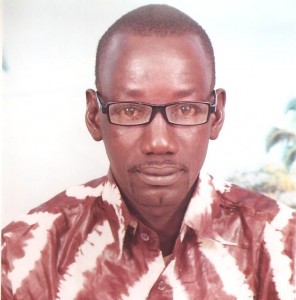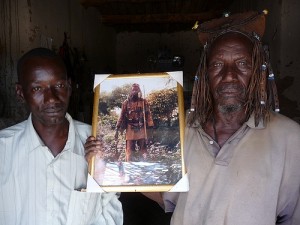 Boukary Konaté, 31, teaches French and English in a high school in Bamako, the capital of Mali.
Boukary Konaté, 31, teaches French and English in a high school in Bamako, the capital of Mali.
Fate, and hard work, brought him from rural Mali to Bamako, where he discovered and fell in love with the World Wide Web.
Joining the translators team at Global Voices in French has steered him onto a new path. He is now involved in multiple projects to promote his native language, Bambara, on the Web, and to bring more Internet access to rural Mali.
If you are on the iPhone and ‘information overload’ side of the digital divide, you will appreciate that Boukary has a sobering, inspiring, and even magical story to tell in this interview.
Q: How did you discover Global Voices in French and decide to join as a translator?
It happened in December '08.
One day, around 8 PM, I was sitting alone in my room in Bamako when I was seized by the wish to learn more. The following words formed in my mind: “I want.” These are powerful words for me.
I got up, went to the cyber café, booked a computer and typed, “I want” in the Google search bar. I browsed the results and found Global Voices en français.
The next day, I enrolled as a volunteer translator.
Q: Your native village, Sanogola-Bamoussobougou, has no electricity, much less an Internet connection. Please tell us a bit about your life.
I am the son of Négué, a farmer, and Djènèba Kané, a housewife. I grew up on a farm, helping my parents. One evening, I was shepherding cows with other kids when we met a man on the road, a sergeant. His Suzuki motorcycle was broken. His name was Lassinè Traoré.
While we helped him, he asked if I went to school. I said “No”. He went to see my father and advised him to send me to school. For weeks, he came back, until my father gave his consent. Sergeant Traoré told me, “There I leave you. You now have the duty to do well at school to honor me, and later to take care of yourself and your parents.”
I walked six kilometers to the nearest school for years until I moved to Bamako to attend high school. I did bricklayer work and odd jobs on week-ends to make ends meet with my state grant. My mother wanted me to succeed in school, she did everything in her power.
I went on to teachers’ school. I would have liked to go to university, but I don't have the means for that. So I trained myself to use a computer and surf from cyber cafés in Bamako. The Web soothed my thirst for knowledge.

Boukary (left) and his father with a picture of him in hunting gear. Photo: Toujours Pas Sages, on Flickr
Q: How well is Mali connected to the internet nowadays?
Mali has done a lot to promote new technologies in government administration, but there’s a lot left to do to connect people, especially in rural areas.
The interest in new technologies is huge, but people cannot access them. The cost of personal computers, training and Internet connections are too high. A new laptop costs that equivalent of six months of a teacher's wages.
In Bamako, an hour in a cyber café costs around 500 CFA francs (USD $1) or even 1000 CFA francs in smaller towns. Compare this to the price of a 50kg bag of rice, which is 17.500 CFA francs (around US $38) it's well beyond the means of most people.
Q: You've not only started blogging since you joined Global Voices, but you blog in Bambara!
It so happened that Maneno.org, a blogging platform for Africa co-founded by Global Voices’ author and translator Elia Varela Serra needed African translators. I speak and write in Bambara, a major language in Mali.
Bambara has special type fonts [see this post] and no keyboard. We overcame this problem with a virtual keyboard. I localized the platform in Bambara and opened my blog, Fasokan. I blog in Bambara and French about Mali, the problems of farmers, and my thoughts.
It is now my great wish to promote African languages on the Web, so that African people can relate and share across the continent. In rural Mali, many people speak and learn to write only Bambara in elementary school. I want them to be able to access the web in Bambara too.
Q: That dream came true this summer?
My dream was to bring the Internet to my village, to introduce my family and the farmers to the Web. Through Global Voices in French, I met Albertine Meunier, who conducts internet workshops with senior citizens in France. We launched the Toujours Pas Sages (Still not wise) project on Maneno, in French and Bambara. Thanks to Fondation Orange Mali, we got a mobile Internet connection for remote places.
With donated laptops and camera phones, Albertine, her friend Caroline and I trained children and grown-ups for two weeks in Ségou and my village to use Google to find information, and use the Web to upload digital photos and videos. The villagers were so surprised that they could read and write in Bambara on the Web! It was a great success.
My father is a hunter and was very curious about hunters in America and how they hunt. On Google, he finally discovered what they looked like. And we also learned that it is possible to charge a mobile phone with a dynamo hooked to a bicycle.
Now, we are going to try and train my pupils in Bamako.








20 comments
It is wonderful to read Bokary’s story and about how the internet is being used in Mali.
I’m very glad that Bokary Konate is supports http://www.AfricaRuralConnect.org.
Hi, I am a researcher looking to hire a short-term translator in Bamako in February. Is there anyway I could get in touch with Boukary?